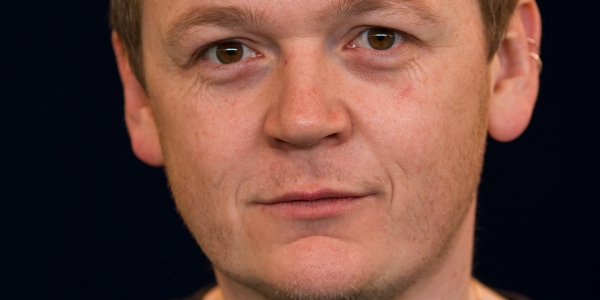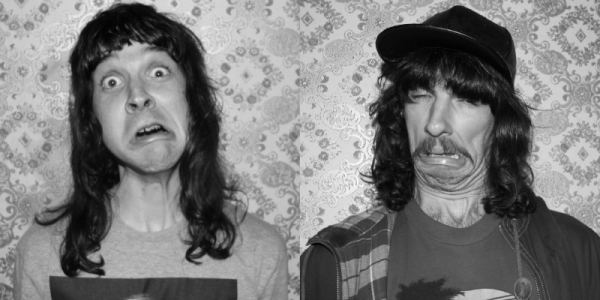“It’s been a love-hate relationship,” explains Gestalt co-founder and editor, Wolfgang Bylsma. A camera crew from the ABC has been following him around for the past three years now. “The documentary process itself is highly intrusive and you get to know the documentary crew very well and they get to know you quite intimately. And as such, you quite often want to punch them in the face, metaphorically speaking.”
Despite the intrusiveness of documenting Comic Book Heroes, Bylsma had fun tormenting the crew with his erratic flight schedule, purposely booking flights that arrived at “five in the morning, so [that the camera crew had] to be at Melbourne long before that” to set up their equipment to film, what was mostly likely, two minutes of footage of Bylsma coming off the plane. Despite all of this, the editor assured us that Comic Book Heroes will be an austere, candid portrait of Gestalt Publishing, including the highs and lows of the publishing house.
“I’ve seen the final cut of the first episode which is going to be screened at Oz Comic-Con actually,” a convention where Wolfgang will discuss Gestalt Publishing and comics alongside other contributing writers, including journalist Andrew Constant (Torn) and Christopher Read (The Eldritch Kid: Hate and Whiskey, Witch King), and contributing comic artists such as Sydney-born Nicola Scott (Torn, Earth 2). Wolfgang will also be offering constructive criticism for fledging comic book artists and writers, if they request to receive it. “I think it [Comic Book Heroes] was intended to document the rise of Gestalt and, in many ways, I think it certainly does show a warts-and-all approach [to] how we do what we do, some of the difficulties that we have to overcome in doing it and some of the successes we’ve had. It’s very honest and I found it quite distressing to watch myself.”
It’s not as distressing as the editor makes it out to be, rather, Gestalt is alike to many other businesses which experience constant fluctuations of highs and low. Whether these triumphs are the critical acclaimed Tom Taylor received for his series The Deep published through Gestalt, or these complications include a delivery of comic books that arrive later than needed at a comic book convention. In spite of these complications, Bylsma and Ogden still persevere because of their ardency for comic books.
“[Gestalt Publishing] was born of a lifelong passion for the comic book medium, both for myself and my co-director in the company Skye Ogden,” enthuses the founder, who grew up on a healthy diet of The Adventures of Tin Tin, Asterix, Famous Five and The Secret Seven; however, it wasn’t until Bylsma’s adolescent years that he discovered what comics could actually do. “Fantagraphics, Drawn and Quarterly, Top Shelf, Tundra, Kitchen Sink Press—they all opened my eyes to what you could do with comics. As a children reading comics, I was reading the traditional superhero fare because that was all I had access to,” explains Bylsma, iterating that it was the works of illustrator and comic book artist Dave McKean (The Graveyard Book, Coraline), Peter Milligan (Bad Company, X-Force/X-Statix), Scottish author Grant Morrison (Batman: The Return of Bruce Wayne, Batman and Robin) and James O’Barr.
“James O’Barr was another huge influence with his graphic novel series The Crow,” he explains. “It certainly shaped my own aesthetic to how we run Gestalt and an appreciation for people that strive to tell their own stories rather than those that strive to draw Spider-Man.” This vehemence for storytelling was one of the reasons Gestalt established a collaboration with indigenous organisation Big hART to produced Neomad.
“[Big hART] work with remote indigenous communities to create a legacy for cultural expression [and] I became aware of [their] project about a year ago,” explains Bylsma earnestly, detailing his appreciation of what the organisation does. “At that stage, they’d already developed the first app which became volume one of Neomad that we’ve published. [After] working with their editorial team and one of the guys that was doing a lot of work with the kids themselves, we fell in love with the story itself and the process. The fact that this was empowering kids in that community, to actively engage [them] with the story…it was something that seemed a perfect fit for us. While sales are good, I simply want to have people reading the story [Neomad] because I think it is magnificent and an example of what can be done when people collaborate to encourage creativity in youth that otherwise may have not had the chance.”
BY AVRILLE BYLOK-COLLARD

